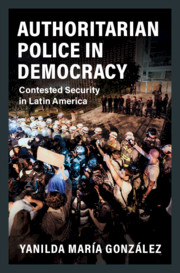Book contents
- Authoritarian Police in Democracy
- Cambridge Studies in Comparative Politics
- Authoritarian Police in Democracy
- Copyright page
- Contents
- Figures
- Tables
- Acknowledgments
- 1 Police
- 2 Ordinary Democratic Politics and the Challenge of Police Reform
- Part I Persistence
- Part II Reform
- Introduction: Pathways to Democratic Coercion
- 6 “New Police,” Same as the Old Police
- 7 The Social and Political Drivers of Reform in Buenos Aires Province and Colombia
- 8 Conclusion
- References
- Index
- Other Books in the Series (Continued from page ii)
8 - Conclusion
Inequality and the Dissonance of Policing and Democracy
from Part II - Reform
Published online by Cambridge University Press: 30 October 2020
- Authoritarian Police in Democracy
- Cambridge Studies in Comparative Politics
- Authoritarian Police in Democracy
- Copyright page
- Contents
- Figures
- Tables
- Acknowledgments
- 1 Police
- 2 Ordinary Democratic Politics and the Challenge of Police Reform
- Part I Persistence
- Part II Reform
- Introduction: Pathways to Democratic Coercion
- 6 “New Police,” Same as the Old Police
- 7 The Social and Political Drivers of Reform in Buenos Aires Province and Colombia
- 8 Conclusion
- References
- Index
- Other Books in the Series (Continued from page ii)
Summary
The concluding chapter explores the often-contradictory relationship between democracy and enduring state violence and the intervening role of inequality. It builds on the book’s key findings to further elucidate the problem that policing poses for democracy, in theory and in practice. The repertoires and distribution of protection and repression in the cases analyzed in this book – and indeed, in many other democracies – are antithetical to what some scholars view as the substantive principles and outcomes of democracy. Yet, these practices are often reinforced by the electoral and participatory processes other scholars have identified as constitutive of democracy. This book’s analysis of three police forces therefore lays bare a tension between procedural and substantive dimensions of democracy. In order to elucidate this tension, the concluding chapter disaggregates democracy and considers how these two dimensions may come to be at odds with one another. The chapter considers how the input of democracy – citizens’ preferences and demands – is channeled through democratic processes such as elections and participatory institutions to produce substantive outcomes that are antithetical to democratic principles. Key to understanding how quintessentially democratic processes result in authoritarian policing practices and structures is the distortions introduced by inequality to each dimension of democracy.
- Type
- Chapter
- Information
- Authoritarian Police in DemocracyContested Security in Latin America, pp. 305 - 327Publisher: Cambridge University PressPrint publication year: 2020

